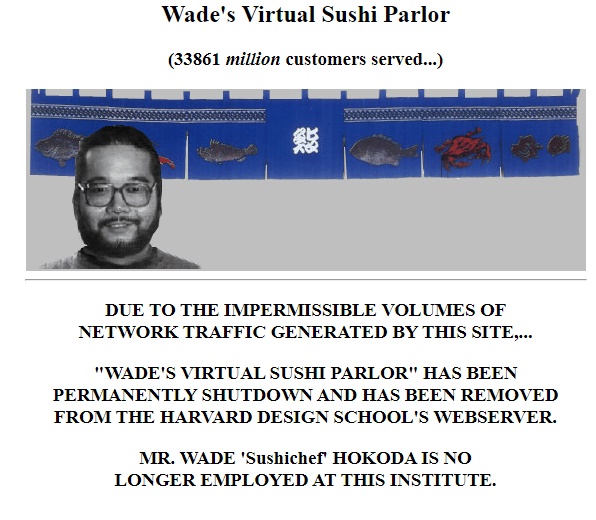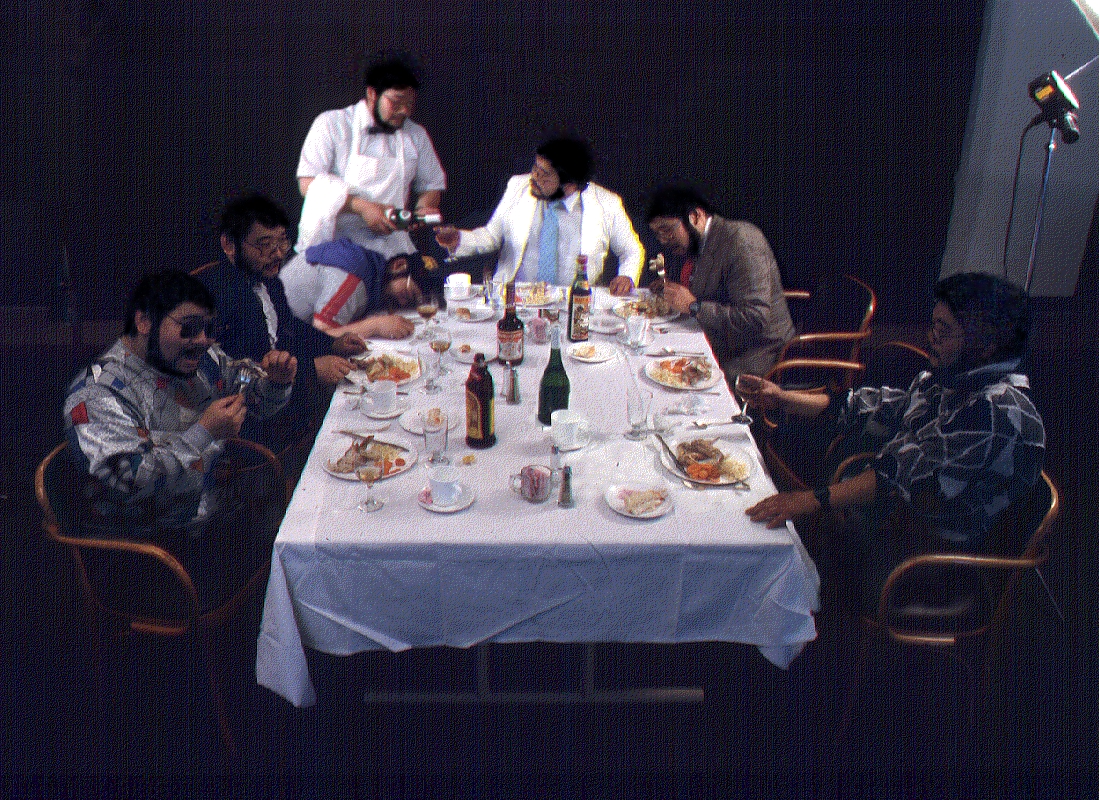Old Net Stories - #1 Wade's Virtual Sushi Parlor
So recently I've been browsing archived Geocities websites and it's really interesting to follow the links that people share on their sites and see where it takes you.
Starting point of today's journey was Japanese Jazz Information. A little personal site from somebody who once had the ambition to make western audiences more familiar with Japanese Jazz musicians. I was not particularly interested in this project as I have honestly tried to enjoy Jazz music on several occasions in my lifetime, but got bored with it every time. However, on the bottom of the page there is a small links section mentioning Wade's Virtual Sushi Parlor. This got my attention. Tossing the link into the Wayback Machine and setting the year to 1997 will bring you to Wade Hokoda's Home Page on Harvard University's network. You will immedeately notice the message about mister Hokoda's sudden death in 1997 and the intention to keep his website up as a 'Testimony to his wizardry'. If you time travel forward just a few years you will find that Harvard did not hold on to this ambition to preserve his legacy very long, as by the early 2000's the site had already been taken down.
In a streak of bad luck it just so happened that Wade was remodeling his virtual sushi parlor around the time of his death, meaning the parlor was offline at the time. A desperate Google search got me only a mention of the sushi parlor in this NY Times article from 1996. They had a weekly report called CYBERTIMES where they featured interesting sites from across the web. It really is just a three sentence mention, but the fact that it made it's way to the NY Times must mean that this sushi parlor had some jazz in it.
Here, you can get that vicarious sushi thrill, price and all. Order what you like from a realistic check-off menu. No language barriers to impede your dining experience. Through the magic of computer scripting (hey, this is another bored Harvard student at work), you get the total number of pieces you requested, as well as the total cash value of your bill. But you don't get any sushi, so if you're on a diet, this is a site you'll enjoy. - Lisa Napoli, NY Times Cybertimes june 1 1996
If you anyway click on the link to the sushu parlor page, you see the following message.

It looks like Harvard's servers could not handle the traffic that this page generated and made mister Hokoda remove it from his site. It also mentions that mister Hokoda is not longer employed at the institute. The more I read these pages, the more unclear it becomes. First of all, did Hokoda write these words himself? Is this message supposed to read as a figure speech or was he actually no longer working at Harvard? Was the 'closed for remodeling' also a joke masking the fact that the parlor was no longer allowed to exist on Harvard's servers? And who exactly was Wade Hokoda?
A look on his Activities page will give you some of his last works. He was working in the department of graphic design and seems to have been experimenting with digital image processing and programming. He was apparently also teaching a course on Image Processing at Harvard. There is a tutorial on how to make magic eyes and there is a really cool artwork called 'Dinner With Wade' that features himself seven times around a dinner table.

Googling Wade Hokoda's name will give you a few results, mostly scientific publications either on graphic design or publications where he did the cover illustrations. The texts are way too technical for me to understand what sort of things he was working on in his professional field. He died suddenly at the age of 40.
So Wade's Virtual Sushi Parlor seems to be gone from the internet. Whenever I stumble upon a dead end like this it makes me sad. I am curious as to how the Parlor would have worked and interacted with users with the programming limitations at the time. It also shows us how easy it is for anything and anyone to disappear from the collective memory of the world. In the digital age, where everything is recorded, saved, copied, shared and leaked, it seems so unlikely for anything to ever become lost. The truth is that things only get preserved if there are enough people who see it's value and make the effort to preserve it. Harvard made an initial effort to preserve mister Hokoda's website, but if it wasn't for the internet archive there would be no trace of that site today either. The Sushi parlor may have been archived if Harvard had not pushed for it to be taken offline (this is just my hypothesis on how the site was taken down by the way). That way we could have visited it today and experience what all the hype was about back in '96. On the other hand I guess this is just a metaphor to life. Most things, be it good or bad, meaningful or meaningless, will eventually disappear.
Published july 10th 2024
Back to Main Page
Back to D-Man's Web

